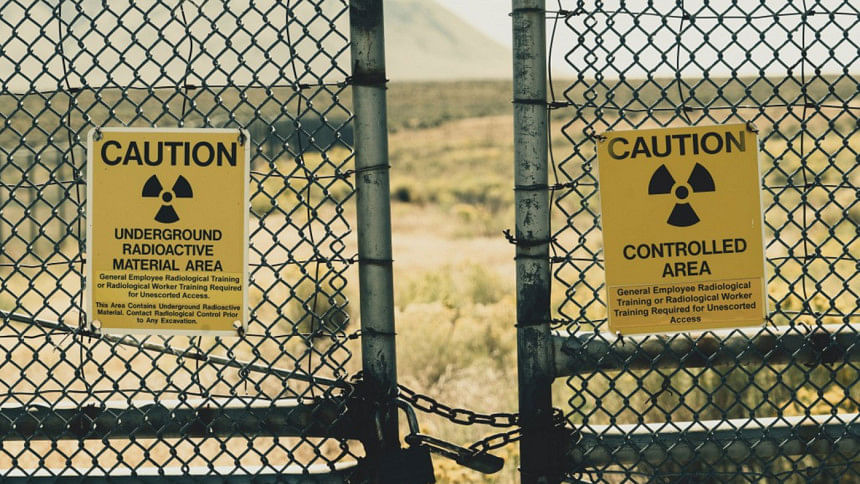Disarmament a priority of Bangladesh’s foreign policy

"We believe that the security of our people can be ensured not through the accumulation of expensive weapons but through education, ending segregation, the promotion of democratic values, and the realisation of human faculties by peaceful means." — Prime Minister Sheikh Hasina at the General Assembly debate on Nuclear Disarmament in New York on September 26, 2013.
Disarmament is a hallmark of Bangladesh's peace-centric foreign policy. Mandated by our constitutional obligation of seeking general and complete disarmament as well as settling disputes through peaceful means, Bangladesh has always intentionally restrained from arms race and armament. Bangladesh is a leading voice in global disarmament debate and has strongly advocated for the total elimination of nuclear weapons and the creation of a nuclear-weapon free world.
We know the United Nations was created from the ashes of the Second World War. The devastation and human suffering caused by the nuclear bombing shook the world and the collective conscience of humankind. The UN, in its very first resolution, envisioned a world free of nuclear weapons.
Since then, 75 years have passed. In 2020, we are celebrating the 75th anniversary of the UN and its achievements and contribution to the welfare of the people and the planet Earth; and also, global socio-economic progress. Yet, in stark contrast, our present and future generations continue to live under the threat of nuclear catastrophe.
And now, the Covid-19 pandemic has presented before us the long-established truth in a more glaring way, that the stockpiles of weapons fail to save human beings. We are convinced that investment in nuclear weapons can neither ensure nor guarantee our peace and security and thus represents a colossal wastage of the world's scarce resources. Rather, it is through the realisation of sustainable development goals that we can establish and sustain peace and stability.
Our Father of the Nation, Bangabandhu Sheikh Mujibur Rahman, in his historic speech before the United Nations General Assembly in 1974, appealed to spare the world from the scourge of nuclear war. This forms the cornerstone of Bangladesh's steadfast commitment and adherence to nuclear disarmament.
It is a remarkable fact that Bangladesh is a party to all major disarmament treaties. Bangladesh is among the 44 countries and indeed the first South Asian Country that have both signed and ratified the Treaty on Prohibition of Nuclear Weapons (CTBT) during Prime Minister Sheikh Hasina's first term in office (1996-2001). In the same period, Bangladesh also acceded to the other important conventions on disarmament including Convention for the Prohibition of the Development, Production, Stockpiling and Use of Chemical Weapons and on their Destruction (CWC), and Convention on Certain Conventional Weapons (CCW) and its Protocol II and IV. During the prime minister's consecutive terms in office from 2009 to 2020, Bangladesh signed and ratified an array of important disarmament treaties and conventions including the 1907 Hague Convention for Pacific Settlement of International Dispute (Accession, 2011); The Arms Trade Treaty, 2013 (Signature, 2013); Protocol 5 of CWC (accession, 2013); and the all-important Treaty on the Prohibition of Nuclear Weapons (Ratification, 2017).
We know that nuclear technology has been recognised as capable of both tremendous benefit and equally unimaginable destruction. Bound by our constitutional obligation to disarmament, Bangladesh rejects the use of nuclear technology for destructive purpose and supports its peaceful application for development and welfare of humankind. To harness the benefit of nuclear technology, Bangladesh is building nuclear power plants for peaceful uses.
On the day of commemoration of the International Day for the Elimination of Nuclear Weapons which was observed on October2, I would like to flag a few points:
First,nuclear weapons themselves are the problems and as the former Secretary-General of UN Ban ki Moon stated "there are no right hands to handle these wrong weapons". Therefore, Bangladesh steadfastly supports the goal of a world free of nuclear weapons.
Second, nuclear weapon states need to take concrete steps to cease nuclear arms race and also to get rid of the risk of nuclear weapons falling in the hands of the wrong people such as terrorists.
Third, nuclear-weapon-free-zones need to be established in all parts of the world through ratification by the nuclear weapons states, they also must ratify the related protocols to all treaties establishing such zones. Prime Minister Sheikh Hasina has consistently advocated for the creation of a nuclear-weapons-free zone in South Asia, and even offered to mediate between India and Pakistan when the two countries were involved in a nuclear arms race.
Fourth, the potentials of nuclear technology for benefit of humankind and the inalienable rights of States for research, production and peaceful use of nuclear energy, without discrimination, must be fostered through effective international cooperation.
And finally, total elimination of nuclear weapons is a long overdue commitment. The pandemic has made it a rallying call more than ever before. Mass awareness and global advocacy need to be promoted and accelerated through effective partnership, including with civil society organisations.
We strongly believe that in a world of finite resources, realising the goals of disarmament means stopping colossal wastages of scarce resources dedicated to non-productive purposes and freeing valuable resources for saving millions of lives and addressing pressing development needs, and ensuring timely achievement of the SDGs
On this momentous 75th anniversary of the United Nations, let us re-commit to use our scare resources for realising sustainable development goals, and making this world safe and liveable for our present and future generations.
Dr AK Abdul Monen is the Foreign Minister of Bangladesh.
This write-up is adapted from his Statement delivered at the High-Level Plenary Meeting of the General Assembly to commemorate and promote the International Day for the Total Elimination of Nuclear Weapons held on October 2, 2020.

 For all latest news, follow The Daily Star's Google News channel.
For all latest news, follow The Daily Star's Google News channel. 



Comments